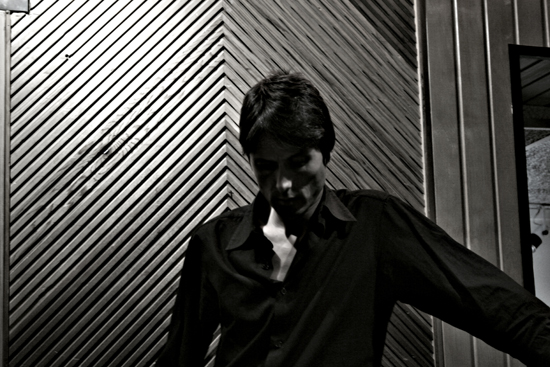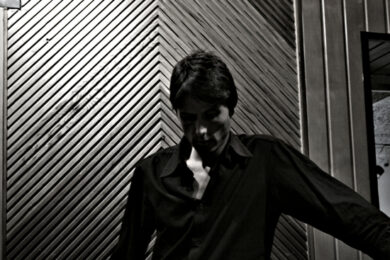Brett Anderson is quite the picture of health. In a nicely cut black shirt and blue jeans he’s tanned and so healthy looking after a holiday in the Mediterranean that there’s almost a whiff of the pilates about him. It’s perhaps not what you’d expect from the feline, androgynous figure who cut such a dash against insipid early nineties indie and scruffy grunge and provided a rich, arch contrast to the drudgery of Britpop, a movement that Suede arguably kick-started, but swiftly disowned. Back with a second solo album Wilderness, nine songs of sparse melancholia delivered by cello, piano, and Anderson’s distinctive yet much-improved voice (read The Quietus review), he seems relaxed, confident and entirely unflustered at how the world might receive him. Over a black tea, he tells The Quietus why holidays with "the missus" are so important to the all-new Brett Anderson:
"I’ve always had a good balance between work and leisure. I think balance is very important in all parts of your life. I wouldn’t want to be the sort of person who ends up on their deathbed regretting things."
Are you more in control of that balance now?
"Yeah, because I’m not doing 18 month tours for every album like we did with Suede. You’d just go a bit mad after a while, with the tour bus life. I have a different lifestyle now, which I’m quite fond of. I don’t particularly feel the need to be in a band or have that sort of life. It’s a great way to spend your 20s, it really is, there’s no better way. But I’ve done that and I don’t want to do it any more."
Did you feel a little trapped in that regime?
"There’s only three things you do in a band, and that’s tour and write and record, and it’s that cycle over and over again. I loved what we did, but it’s a repetitive way to live your life and I don’t think repetition is good for anyone. It’s good to break out every time you feel like things are becoming routine, and that’s what happened with Suede. I felt as if it was becoming a bit of a job, and none of us got into it for it to become a job. It was always supposed to be a bit more special than that. That’s when I thought, well, let’s do something else."
Has your new lifestyle freed you creatively too?
"Absolutely. I’m creatively free because I don’t have any restrictions on what I do. That’s the beautiful thing about having made this record in particular, because I felt completely free of anything, even a record company. To be honest, record company involvement with my work has been quite limited anyway, but you still have those pressures, to get songs on the radio and all that rubbish. I don’t have any of that any more because my songs don’t get on the radio any more, and that’s fine by me."
So you were writing the record more on your own terms?
"The only criteria for Wilderness was making some beautiful songs. No matter how much artists might deny that they’re trying to please anyone apart from themselves, I think subconsciously they’re probably thinking that a little bit. It’s simple economics, everyone’s got mouths to feed. Especially when you’re in a band, you’ve got a responsibility to the other members, it’s like a big family. As leader, or whatever I was in Suede, I was like the paternal figure or the chief breadwinner. I had to make sure all my little kids were sort of looked after. That’s pressure in itself, and that’s a pressure I don’t really have now."
How has this made Wilderness differ from your first album?
"I think on the first album I still hadn’t really found my sound. That’s what I realised very recently, that Wilderness is the first album where I’ve established where I want to go with my music and felt completely confident about it. I’d never slag off the first record because it’s got some great moments, but I think you always have to learn from what you’ve done and look at it honestly. You have to believe in every record you make at the time, but looking back it suffers a little bit because there’s a sense of compromise. I was entering into the whole thing with a band mentality, and the same way of releasing music: ‘here’s a single and we’ll get it on the radio’. It’s a career by numbers thing that you always do. On Wilderness I’ve been completely free of that, there wasn’t an issue about making a video to get on MTV, so it left me completely free to find my own sound. That’s the biggest artistic step that I made with this album.
Brett Anderson performs ‘Blessed’ at the Mermaid Theatre
"I don’t have that desire that I need to be number one or anything like that. I see people still chasing that, and I kind of feel a bit sorry for them actually. People who were my contemporaries and they’re still chasing the charts. Pfft, I suppose if that’s what you want to do, but I don’t know…"
How does Wilderness relate to your past work?
"This record is closer to Dog Man Star than anything I’ve done since. It hasn’t got rock guitars or anything like that, but some of the landscapes on it are similar. There’s a parallel because when we were making Dog Man Star we weren’t making it for any other reason apart from it being the record we really wanted to make. With the debut Suede album we were trying to put our heads above the parapet, make a splash and write songs like ‘Animal Nitrate’ and just trying to be a bit out there. With Dog Man Star we felt so ahead of the pack that there wasn’t any sense of wanting to keep up with this band or whatever, so we just did what we wanted to and wrote songs like ‘Introducing The Band’, and ‘The Asphalt World’. We were quite creatively free making that album, and that’s the parallel I think."
It does seem to be getting favourable responses. I noticed an interview with you on the Guardian site was one of the most read last week.
"Hopefully it’s struck a chord with some people. I think in its own little quiet, dark, stark way, it is quite a beautiful little record. It doesn’t really sound like anyone else, to be honest."
It doesn’t even necessarily sound like what we might have expected from you…
"I’ve believed in records before, and been sorely disappointed by people’s reactions to them. The first album was like that, where I was quite shocked by the negative reaction. I wasn’t hearing the same record that most people were hearing, and I’m still a little baffled by that, I wouldn’t disown it at all. I think if there’s anything that strikes a chord with people it’s the simplicity of the idea of what it is: it’s me, the piano and a cello player, it’s nothing more complicated than that. I think that simplicity is very powerful."
Was that why you’ve rearranged a lot of Suede material for the new set up for gigs? At the Mermaid Theatre gig the Suede songs really stood up, played really simply, especially the grandiose Dog Man Star material…
"It shows that they’re strong songs. You can change the arrangement of a good song like you can change the clothes on a beautiful body, they’ll hang right. I’ve always written with the sense that you can strip a song down to it’s basic components and it’s just as powerful. When I started rearranging some of the old Suede songs I was shocked at how it seemed to unlock their soul. ‘Trash’ is a really good example. ‘Trash’ is probably the best song I have ever written, but the recording of it is nowhere near the best thing I’ve ever done. Just as a song, melody and words, it’s a really strong song. The way I play it now, with just guitar and cello, it unlocks something. The recording of it sounds slight and weak in comparison, it hasn’t got the soul that it’s got now."
Brett Anderson plays ‘Trash’ acoustic
You’ve said that Wilderness is a very romantic album, yet to me Suede were always the most romantic of bands. How has your idea of romance changed?
"Probably my concept of romance has changed from a romantic concept of romance to an actual concept of romance, if that makes any sense. I had a picture of myself as a fragile, Byronic figure stumbling through the urban wasteland, and it’s quite beautiful, like some poet dying of consumption. That was the cartoon model that I had and now romance is very real, but much more beautiful, and much less idealised. If the songs have any power and resonance with people it’s because they’re pages out of my life, they’re not me imagining things, they’re not me writing in character or a persona, they’re me writing about my life and finding little pockets of it that I think are worth writing about. That’s the difference. On Dog Man Star there was a lot of personal stuff on there as well, but I probably made it overly poetic, in a sense, I probably over-elaborated. I turned it into this quite baroque vision of what it was like to live in the city. I’ve always tried to simplify my writing and make it less flowery."
Did you feel trapped by that idea of Brett Anderson?
"Yeah, definitely. Talking about the end of Suede, I felt like I’d painted myself into this corner. It wasn’t a fictional character that I’d made up, but I was aware and careful of nurturing it, kind of self aware and self-conscious. But it did get a bit out of hand. It was such a simple, strong character that people could understand and it was easy to kind of write your own Brett Anderson song and come up with, you know, the hair [mimes a floppy fringe] and the jacket, but there’s nothing wrong with that."
Bands with such a strong aesthetic are a rare thing. But it can be a problem when people don’t grow up…
"Exactly. That’s what the fans liked about it in the first place, but I did feel slightly claustrophobic. It was difficult to develop Suede because it was such a strong idea of what it was, and such a strong sound, because of my voice. With the last Suede album, a lot of the mistakes of that album – that’s the only album throughout my career that I feel I dropped the ball on, I’d have to hold up my hands and say that it was under par – a lot of it was because I was looking for a new identity, and it’s hard to find a new identity in a band. In a band it’s like steering some huge ship, it’s not really manoeverable, you can’t really throw new clothes on, it’s quite difficult. Lots of it was the frustration of that, and I felt like the band had to end. I didn’t really know where to take it."
There were a lot of changes in your life then. How did you succeed in dealing with the excessive behaviour that went with the Byronic Brett Anderson character?
"It was ego. It was knowing that I had something important to do with my life, and I couldn’t let it get in the way of that. It was an over-inflated sense of ego, and it made me survive."
Would the younger Brett Anderson have recognised older Brett Anderson, who makes albums like Wilderness and has holidays in the Med?
"I think that young Brett Anderson would have been most pleased about the fact that old Brett Anderson has still got his own hair."



